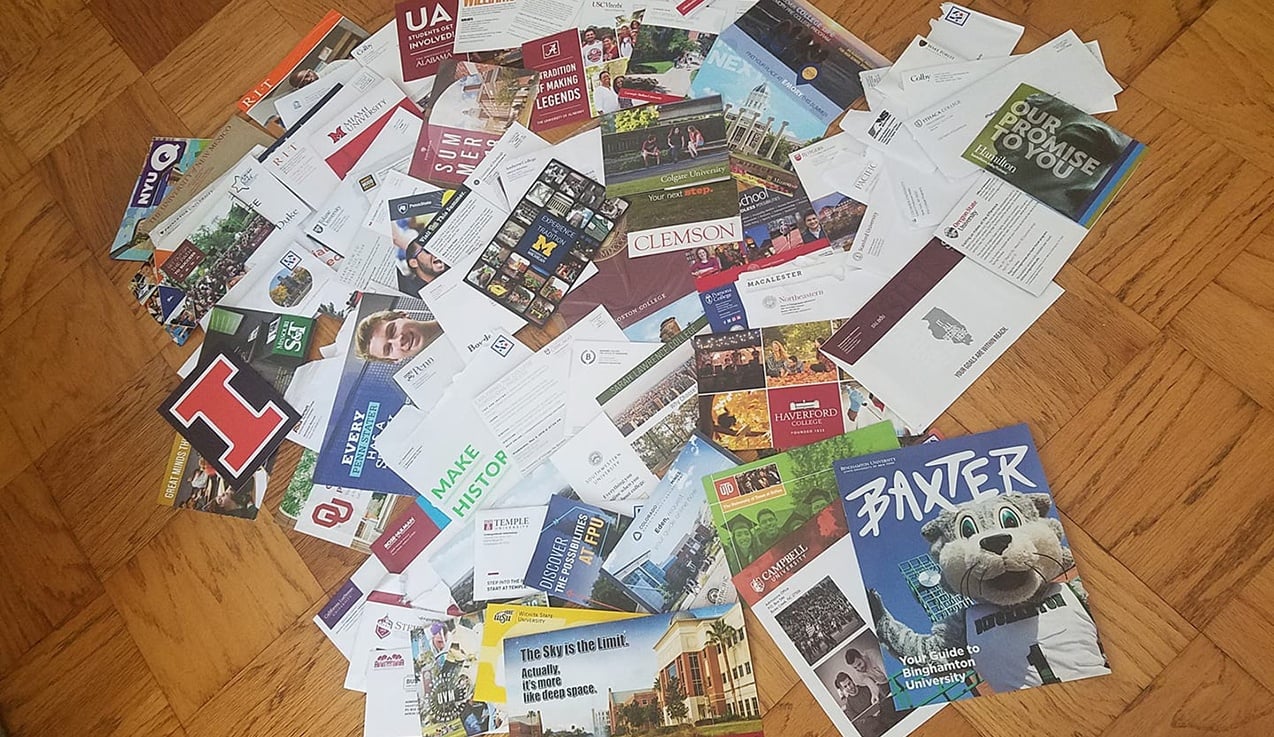Last week a few of the parents who are members of my private Facebook group, Application Nation, posted pictures on our discussion board of the pile of mail their kids have been accumulating from colleges. We all got a good laugh about the variety of colleges sending mail and how different the marketing strategies were. Yet many wondered what it all meant.
If you are a high school student or a parent like them, get ready for this onslaught. Starting soon, if not already, you will begin to get mail (or emails) almost every single day from colleges who somehow know your name, address, and even what major you are considering. But how?
Believe it or not, colleges buy students' information from the College Board when they take the PSATs so that they can start targeting them with marketing materials as early as possible. This year, Yale mailed out an 80-page glossy brochure. Just last week, Tulane blanketed the U.S. with emails and mailed envelopes titled,"Congratulations Are in Order!" to rising high school seniors. And many more colleges will try to outdo the next in order to get the student's attention and ultimately get them to apply.
In fact, if you got that email or envelope from Tulane, your application fee is waived, you are automatically considered for a merit scholarship, and then you might have a chance of an alumni interview too—that is if you
apply Early Decision or Early Action. If I was a student or parent and didn't spend half of my career as an Associate Dean and Dean of Admissions working for colleges, I would think that meant admission was almost a guarantee and a merit scholarship would likely follow. Unfortunately, that's not always the case.
The truth is that colleges spend hundreds of thousands of dollars on buying students' names, photography, publishing, and marketing to get students to apply. More applications for a college translates into job security for the Dean of Admissions, a lower admit rate, and bragging rights about record high application totals each year.
"Colleges spend hundreds of thousands of dollars each year for one thing—getting as many students to apply as possible." TWEET THIS
For students and parents, understanding the colleges' strategies behind these mailings and emails can be surprisingly empowering. The fact that the student received mail from a college tends to mean that some aspect (academic or biographical) about themselves is of interest to the college. It could be their race, test scores, academic major, and/or possibly even home state—right down to the zip code! But having that one thing that the college is interested in is not a guarantee of admission. Instead of jumping in head first and applying, families should
take time to consider the college and especially the admissions data to determine if submitting an application is the right move for the student.
Here are some pointers to consider as the mail starts to pile up:
- Students and parents should have a discriminating eye, whether it's Tulane suggesting merit scholarships or another college waiving the essay and/or fee.
- View these materials as informative rather than a golden ticket of acceptance.
- A strong brochure will be inviting and intriguing right from the start—for students that know the institution and those who don't.
- Try to recycle the brochures of no interest right away. If not, you might need a separate room in your home for what is to come!
- Read through the brochures of interest and pull out different themes and opportunities. This will help you decide where to visit, where to apply, and what to do if you get admitted.
The stakes are high here. It's your future. Understand that getting these brochures is a rite of passage for any college-bound student. However, knowing the colleges' strategies behind these brochures is crucial. Colleges may want you in the end. But during this "shopping" period, they just want your application.
Before you grace them with your application, make sure the college is
a good fit for you academically, socially, and personally.
When that happens, the student is in the driver's seat and the college will be desperate to get mail from you.







.jpg)




